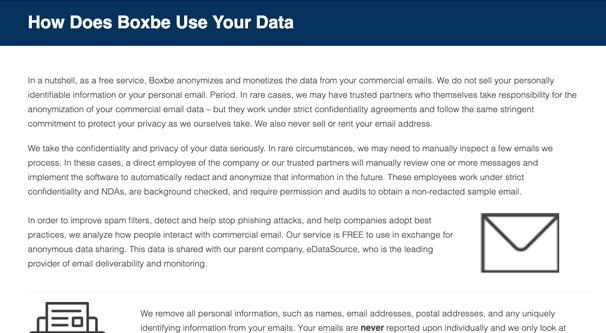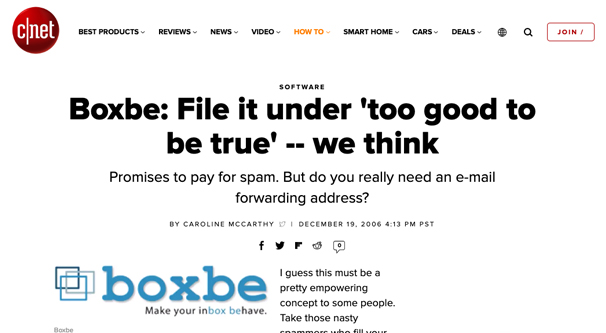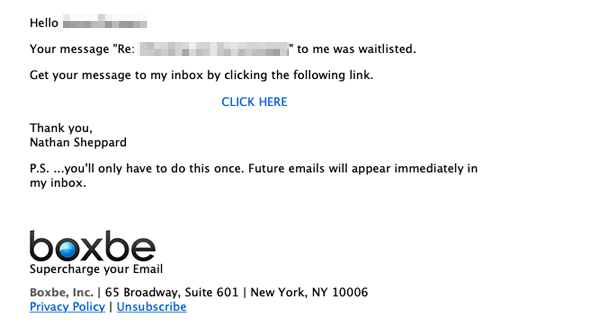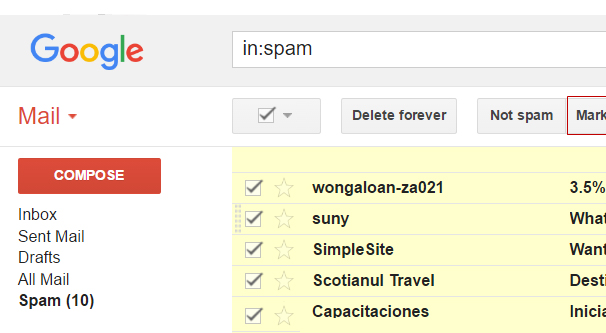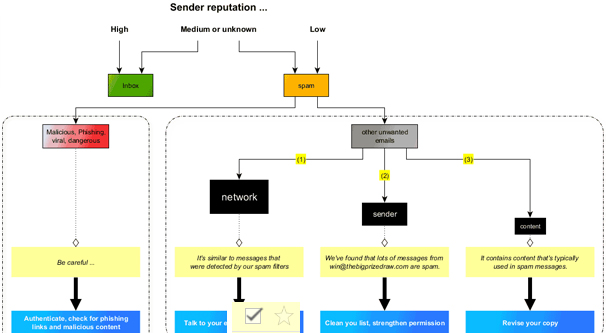Is Boxbe a Safe and Legitimate Service to Use?
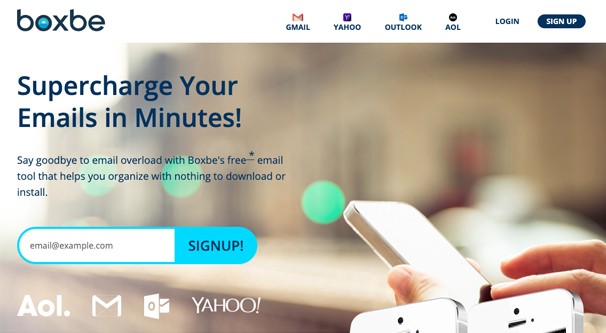
If you frequently send out emails, you may have encountered Boxbe before. Or maybe not! It’s an interesting service that has some difficult connotations and a few issues. Let’s talk about it.
What is Boxbe?
Boxbe is an email spam filtering service that was founded in 2005 by Thede Loder and Corbett Barr. You can find their website here. Since their debut over a decade ago, they have expanded their service and added some additional features.
What features does their platform have?
Email spam filtering. This is their main feature, and the one I’ll go into more detail about. Essentially, when you set up Boxbe, you set up a whitelist of email addresses. These are the people and businesses allowed to message you. Anyone who isn’t on the list is challenged.
Their message basically bounces, and the response asks them to verify that they’re human. They click a link in the email, which verifies that they’re human and not a bulk email spam bot, and their message makes it through to your inbox. You can then decide if you want to keep that user on your whitelist, or if you want to blacklist them so you never see their messages again.
Note that messages don’t actually bounce. They’re added to a folder of unapproved senders. You can still access this folder and view those emails manually if you want, particularly if you think a sender you want to talk to isn’t going to take the time to click the Boxbe link.
Any message that arrives in your waiting list folder will linger there for 30 days while Boxbe tries to solicit verification of the sender. If they aren’t verified, and if you don’t go in to take action on them directly, after 30 days they will be deleted.
Email cleanup. Boxbe is able to go through your inbox and delete “duplicate” emails. They frame it as removing “previous editions” of your emails, i.e. the quote strings and duplicate messages that clutter up an inbox over time. I’ve personally never found these to be much of an issue, but hey, to each their own. It also allows you to go through and mass delete old newsletters and promotional emails, social media status notification emails, and other common, useless-when-old messages.
Contact prioritization. When you sign up for Boxbe and run it on your email client, it scans your contacts and adds those people to your whitelist. You don’t have to manually go through and add your friends and family manually.
Phishing protection. Because of the whitelist, you’re protected somewhat from email phishing scams. If your bank is on the whitelist and someone pretending to be your bank sends you an email, you’ll never see it. They probably aren’t clicking the Boxbe link to approve their message, and you probably won’t pull it out of the unapproved sender list.
Boxbe works with email addresses at webmail servers. Specifically, they support Yahoo Mail, Gmail, Google Apps, and AOL Mail. This does not include Microsoft’s webmail version of Outlook, any stand-alone email clients, or even other webmail clients. All in all, it’s pretty slim in availability, though since it covers Gmail, it has a pretty huge base audience.
How Much Does Boxbe Cost?
If you’re familiar with spam filters, you probably recognize that they can cost a lot of money. Something built into Gmail is free, of course, but getting something corporate-level like Mimecast or Spam Titan can cost hundreds or thousands of dollars per month. If Boxbe is effective, it’s probably expensive, right?
In actuality, Boxbe is completely free. There are no paid plans available at all, in fact; you sign up and you’re good to go.
Now, those of you who are familiar with free services already know what’s going on here. How can a 14 year old, widespread email service be free? They have to be making money somewhere, right? Indeed, they are; they harvest your data and sell it.
On the plus side, unlike some apps in the past, Boxbe discloses all of this up front. They anonymize and sell your data. Nothing they sell is personally identifiable, but it’s still your data, in aggregate, being sold. There’s no list of companies they sell to, of course, but it all goes through the Boxbe parent company, eDataSource.
Additionally, you can opt out of having your data aggregated and sold. The opt-out page is here. Now, I don’t think anything bad happens if you opt out, but it’s entirely possible they could either ignore you – since there’s not much way you could ever find out – or find some excuse to ban you from their service in revenge. I haven’t heard of any such stories, at least, so you may be safe.
The parent company eDataSource is also not really one of those behind-closed-doors evil tech giants. You can find a lot of public information about who they are, what they do, and what tools they implement using data from their various sources, one of which is Boxbe. This article is one such example. They also have relatively decent reviews, though we all know how easily those can be messed with.
Historical Features
Now here’s something interesting I’ve come across from before my time. Back when Boxbe was first released, reviews talking about it indicate that it worked in a somewhat different way than it does now.
What it did back then was allow you as the email account owner to set a fee to get emails through to you. The idea, I suppose, was to monetize spam and/or marketing messages. You could say “hey, to message me you have to send me $1”, and then presumably people who really wanted to contact you – and who were not on your initial whitelist – would have to fork over the cash.
Of course, there’s no way this would work out in reality. Absolutely zero spammers and no marketing companies with mass email lists are going to send you a dollar to get into your inbox. They’ll see that your email bounced – they don’t care what the reply is – and they’ll remove it from their list. Hell, I imagine a lot of the big name email management clients would just automatically remove Boxbe email addresses from their list.
I assume that this was a disused feature because at some point Boxbe abandoned it. There’s no mention of it in their current website or features list, and nothing about payments in their FAQ.
It’s simply interesting to me how an app like this can evolve over time, and I thought it was worth mentioning that this isn’t what the modern Boxbe does. If you want to shed more light onto this situation, feel free to leave me a comment.
My Problems with Boxbe
I personally have a few problems with Boxbe, though none of them are with the goal or the service itself. I just have a few issues with it in a sort of social and industrial sense.
First of all, Boxbe basically sends out spam with your name attached to it. It’s not actually spam, but it’s basically spam; everyone who messages you gets an automatic reply from you from Boxbe. This is a big issue in the email industry.
Now, this isn’t going to get your email address or business blacklisted because of it, at least not because of some spam designation. I figure that after almost fifteen years, they have some kind of understanding with the major email providers. However, it’s entirely possible that the Boxbe emails themselves can end up spam filtered.
It doesn’t do you much good if the people sending you messages never see the Boxbe email, does it? If they don’t see the response, because it’s filtered, they can’t click the button to get their message punted into your inbox. You never know they were trying to contact you.
This means you can miss out on a lot of different opportunities. If someone wants to send you a message about your business, or a guest post pitch, or a response to one of your own inquiries, it just might not get through.
I suppose on the plus side, when you send an email to someone, that contact is automatically added to the whitelist, so you won’t miss responses. On the other hand, if you’re in a position of running a business where you may get unsolicited pitches, putting this roadblock in the way is the last thing you want to do.
There’s also the social element of people who simply don’t want to click such a link. For anyone who hasn’t encountered Boxbe before, the idea of having to click a strange link in an email from a company they’ve never heard of, just to get through to the person they were trying to message, sounds like complete bullshit. It’s the kind of scheme I would make up if I wanted to phish people, check for active emails on a list of cold addresses, or otherwise scam people.
Indeed, this is also a common problem. Phishers are using the Boxbe email template to try to get people to click links they shouldn’t in emails from senders they don’t otherwise trust.
In fact, this is by far my biggest concern with Boxbe; it’s training people to click links in emails when they aren’t supposed to. Sure, with Boxbe specifically it does that it intends to do, which is push through and prioritize an email message. When it’s some other sender, or a scammer mimicking the Boxbe format, or another company trying to set up something similar, you never know what could happen. One stray click can cryptolocker your computer or your entire business, and that’s very much not a position you want to be in.
Another issue I have with Boxbe is the fact that, as a spam filter, it’s not really that necessary. Now, 15 years ago when webmail was relatively new and unsophisticated, I can definitely see the appeal. These days, webmail providers like Gmail have extremely good spam filtering. It’s difficult to get a spam message past the filters these days, and those that do are quashed quickly.
Really, I don’t see much point to this kind of spam filter on an individual level. If you want to use it on an institutional level, you’re better off opting for an actual business-class spam filter with whitelisting and blocking at the server level. These work much better, are much more flexible, and aren’t relying on user interaction for their blocking and verification.
As a minor nitpick, I don’t really like that Boxbe straight-up deletes messages after 30 days if they aren’t verified. It’s entirely possible to miss a good, worthwhile message because of that, though admittedly if you don’t get to it in a month, it’s kind of on you.
Is Boxbe a Scam? Is it Safe?
Despite my problems with the app, Boxbe is not a scam. It works as intended. It doesn’t charge you surreptitiously. There are no hidden fees or limited cancellation periods. While they do scrape and sell your data, they’re up front about doing it and give you the option to opt out if you don’t want them to do so.
Perhaps the best use of Boxbe is phishing protection. Since Boxbe attempts to authenticate incoming messages, it can easily filter out emails that are meant to look like they come from your friends or trusted contacts but don’t. Still, there are better phishing protection apps out there.
If you want to use Boxbe, by all means, go right ahead. Just don’t expect it to be a flawless experience with buy-in from all of your contacts.



